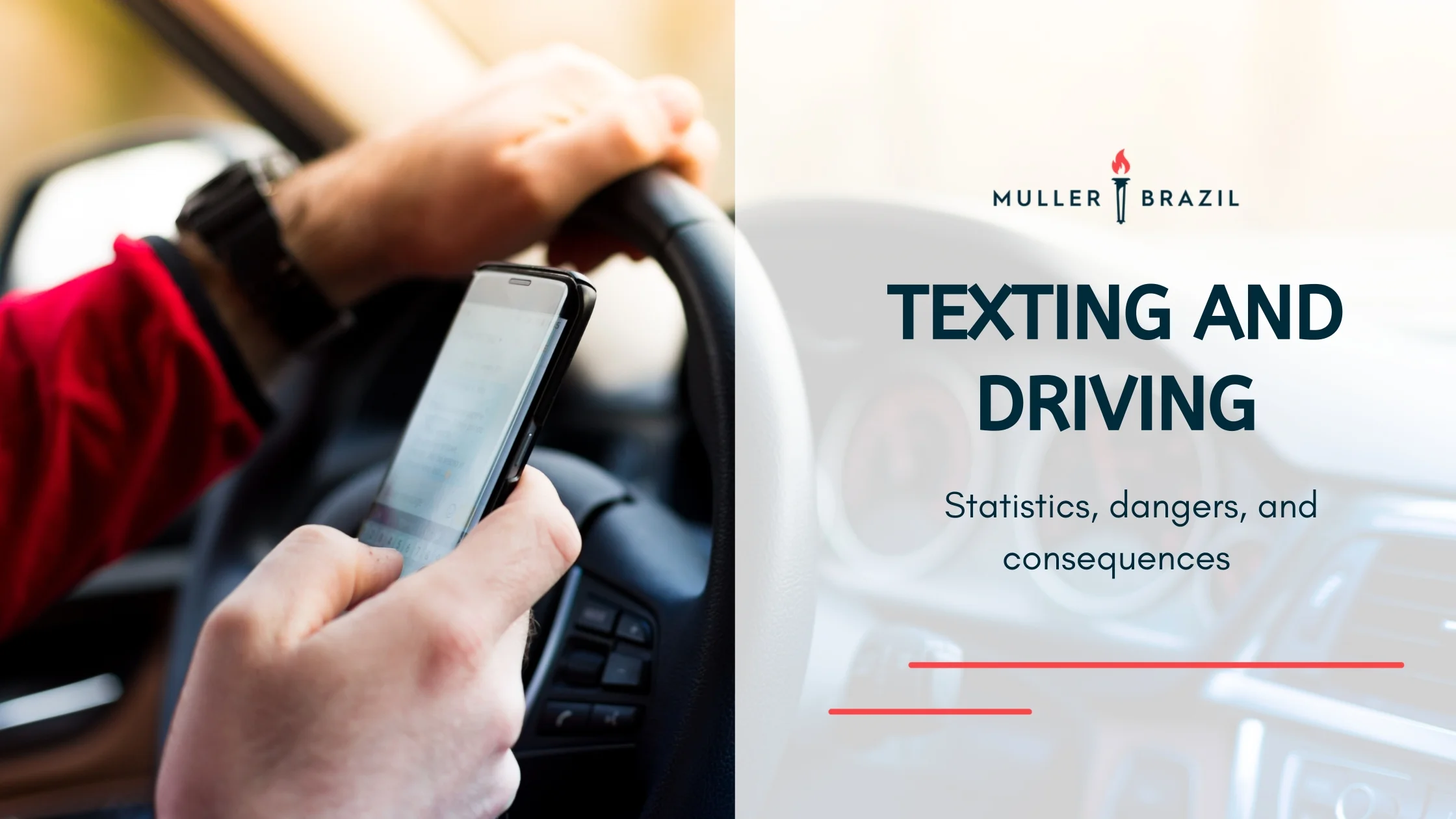7 min read
Texting and Driving: Legal Help for Victims and How to Seek Justice
![]() Maximillian J. Muller, Esquire
Apr 12, 2023 8:12:23 AM
Maximillian J. Muller, Esquire
Apr 12, 2023 8:12:23 AM
Texting and driving is a dangerous behavior that has become increasingly common on our roads. This reckless act often leads to severe accidents, causing harm to innocent victims. If you or a loved one has been injured due to a distracted driver, understanding your rights and seeking legal help is important for receiving the justice and compensation you deserve.
Alarming Statistics and Facts
Using your phone while driving distracts you, making accidents more likely. Unfortunately, many victims of these accidents are innocent drivers, passengers, and pedestrians who suffer due to someone else's negligence. Contacting a personal injury lawyer immediately after such an incident can help you get compensated and hold the other driver responsible.
As personal injury lawyers, we have seen firsthand the devastating consequences of distracted driving on victims and their families. If you are involved in an accident caused by a texting driver, it's important to speak with a personal injury attorney as soon as possible. Our experienced lawyers in Pennsylvania can help you get compensation for damages and hold the other driver accountable for their negligence.
The use of cell phones while driving has been a significant cause of accidents on the road, with texting and driving being a prevalent form of distracted driving.
- According to the National Safety Council, cell phone use while driving causes 1.6 million accidents annually.
- Texting while driving is six times more likely to cause an accident than driving under the influence.
- Distracted driving claimed 2,841 lives in 2018 alone, as reported by the National Highway Traffic Safety Administration (NHTSA).
- 9.5% of fatal crashes in 2019 involved distracted driving accidents, according to the NHTSA.
- According to the National Safety Council, pedestrian fatalities due to cell phone use increased by 800% between 2007 and 2016.
- These statistics highlight the dangers of cellphone use while driving or walking and the importance of practicing safe cell phone use.
Teen Driver Cell Phone Statistics
Teen drivers are particularly susceptible to the risks associated with cell phone use while driving.
- Distracted driving causes more than 1 in 4 car accidents involving teen drivers, as reported by the Centers for Disease Control and Prevention (CDC).
- According to the AAA Foundation for Traffic Safety, teen drivers are four times more likely to be involved in a car accident when using a cell phone while driving.
- A survey by the American Psychological Association found that 38% of teen drivers admitted to texting while driving, and 56% of parents admitted to receiving phone calls from their teens while driving.
- These statistics emphasize the need for increased education and enforcement of safe driving practices for teen drivers, including the risks associated with cell phone use while driving.
Why Cell Phones Are So Dangerous for Victims of Texting and Driving
Cell phones, when used while driving, pose a danger to everyone on the road, especially innocent victims who suffer due to distracted drivers. Here are some reasons why texting and driving are particularly hazardous for victims:
- Increased Risk of Accidents: When drivers use their cell phones, their attention is divided between the task of driving and the conversation or activity on their phone. This divided attention makes it harder for them to react to unexpected situations, resulting in accidents like rear end collisions that often injure innocent victims.
- Cognitive Distraction: Even hands-free cell phone use can create cognitive distractions. A driver's brain is focused on the conversation rather than processing visual information, which ends in missing key signals and failing to react appropriately, putting others at risk.
- Delayed Reaction Time: Studies have shown that using a cell phone while driving delays reaction times, impairs judgment, and reduces the ability to anticipate potential hazards. This delay can lead to accidents where victims are left to deal with the aftermath.
- Reduced Situational Awareness: Drivers who use their cell phones while driving have reduced situational awareness, making it harder to scan the road for potential hazards or to be aware of pedestrians, cyclists, or other vehicles. This lack of awareness creates accidents, leaving victims to suffer from injuries.
Overall, the use of cell phones while driving has significantly increased the risk of accidents, injuries, and fatalities on the road. For victims of these incidents, the consequences can be devastating.
Most Affected Population of Texting While Driving
Texting while driving is a dangerous behavior that particularly affects teenagers and young adults, leading to numerous accidents where innocent victims suffer the consequences. Understanding why this age group is more prone to such behavior can help victims realize the importance of seeking justice and compensation.
- Inexperience: Teenagers and young adults are generally less experienced drivers. Their inability to react quickly to unexpected situations while texting increases the likelihood of causing accidents that injure other drivers, passengers, and pedestrians. Victims of these accidents often face severe injuries and substantial medical costs due to the inexperience of young drivers.
- Peer Pressure: This age group is highly susceptible to peer pressure and social norms that might condone using a cell phone while driving. As a result, victims find themselves suffering from the negligence of young drivers who prioritize social acceptance over road safety.
- Addiction to Technology: Growing up with technology, younger generations are more attached to their phones and more likely to text while driving. This attachment leads to frequent distractions and, consequently, accidents that leave victims dealing with physical, emotional, and financial repercussions.
- Risk-Taking Behavior: Teenagers and young adults are more inclined to engage in risky behaviors, including texting while driving. These risk-taking tendencies often result in accidents that have devastating impacts on victims, including serious injuries, loss of income, and emotional trauma.
- Lack of Awareness: Many young drivers do not fully understand the dangers of texting while driving and underestimate the risks. This lack of awareness leads to accidents that can have life-altering consequences for victims who were simply in the wrong place at the wrong time.
Importance for Victims to Come Forward
Victims of accidents caused by texting and driving, particularly those involving young drivers, should not hesitate to seek legal recourse. Understanding the behavior and tendencies of these drivers highlights the need for accountability and justice. By coming forward, victims can:
- Seek Compensation: Legal action can help victims recover medical expenses, lost wages, and other costs associated with the accident.
- Hold Negligent Drivers Accountable: Making sure that the responsible party is held accountable can deter future distracted driving incidents.
- Raise Awareness: Victims’ stories can highlight the dangers of texting and driving, promoting safer driving habits among young drivers.
Consequences of Texting and Driving for Victims
Texting and driving can have devastating consequences, particularly for victims who suffer due to another driver's negligence. Understanding these consequences can help victims realize the importance of seeking legal representation to obtain justice and compensation.
- Accidents and Injuries: Texting while driving significantly increases the risk of road accidents. Victims often face serious or life-threatening injuries, such as broken bones, spinal injuries, traumatic brain injuries, and more. These injuries can lead to long-term medical treatment, rehabilitation, and a reduced quality of life.
- Legal Consequences for the Driver: Texting and driving is illegal in many states, and drivers caught engaging in this behavior can face fines, license suspension, and even jail time. For victims, knowing that the law supports their case can be crucial when seeking compensation and holding the responsible party accountable.
- Financial Burden on Victims: Accidents caused by texting drivers can result in substantial financial costs for victims. These can include medical bills, car repairs or replacement, and lost wages due to the inability to work. Pursuing legal action can help victims recover these costs and alleviate financial strain.
- Emotional Impact: The emotional toll of being involved in a texting and driving accident can be significant. Victims may experience trauma, anxiety, depression, and PTSD. The emotional distress can also affect victims' families, who suffer alongside them. Legal representation can help address these non-economic damages.
- Insurance Challenges: Victims may face increased insurance rates or difficulties with insurance claims after an accident. An experienced attorney can assist in navigating these challenges, ensuring that victims receive the compensation they deserve without undue hassle.
Why Legal Representation is Necessary for Victims
Seeking legal representation after an accident caused by a texting driver is important for several reasons:
- Expertise and Support: Experienced personal injury attorneys understand the complexities of these cases and can provide the necessary support and guidance throughout the legal process.
- Maximizing Compensation: Attorneys work to make sure that victims receive fair compensation for all damages, including medical expenses, lost wages, emotional distress, and more.
- Holding Negligent Drivers Accountable: Legal action can hold the responsible driver accountable, promoting safer driving practices and potentially preventing future accidents.
- Navigating Legal Processes: An attorney with Muller Brazil will handle all legal aspects of the case, from gathering evidence to negotiating with insurance companies, allowing victims to focus on their recovery.
How to Address the Consequences of Texting and Driving Accidents
Texting and driving accidents can have devastating effects on victims, leading to severe injuries, emotional trauma, and financial burdens. For victims seeking legal representation, understanding the steps to take after an accident is key for obtaining justice and compensation.
Steps Victims Should Take After a Texting and Driving Accident
- Seek Immediate Medical Attention: Your health and safety are the top priority. Seek medical attention immediately, even if injuries seem minor. Documenting your injuries will be key for any legal action you pursue.
- Document the Accident Scene: If you are able, take photos of the accident scene, including vehicle damage, road conditions, and any visible injuries. Collect contact information from witnesses who can support your account of the incident.
- Report the Accident: Confirm that the accident is reported to the police. A police report can serve as a necessary piece of evidence in your legal case, providing an official account of the incident.
- Avoid Discussing Fault: Do not admit fault or discuss the details of the accident with the other driver or insurance companies before consulting with a personal injury attorney. Statements made at the scene can be used against you later.
- Consult a Personal Injury Attorney: Contact an experienced personal injury lawyer as soon as possible. They can help you navigate the legal process, gather evidence, and build a strong case to secure the compensation you deserve.
Injured By a Texting Driver? Contact Us Today
If you or a loved one has been injured in a texting and driving accident, it's important to seek legal help immediately from a Philadelphia car accident injury lawyer. The experienced attorneys at Muller Brazil can help you understand your legal options and guide you through the process of pursuing compensation for your injuries.
We understand the devastating impact of texting and driving accidents on your life, and we are committed to helping you recover the compensation you deserve. Our team will work tirelessly to investigate the accident, gather evidence, and build a strong case on your behalf.
Contact us today to schedule a free consultation with one of our experienced attorneys. We are here to help you get the justice and compensation you deserve.
Meet the Author
Max Muller - Founding Partner
Maximillian J. Muller is a founding member of Muller Brazil and My Vaccine Lawyer. Mr. Muller is an experienced litigator in both Federal and State Courts in the areas of vaccine injury, unsafe drug and medical device injury, personal injury, mass torts, and bad faith. Mr. Muller prides himself on keeping Muller Brazil on the cutting edge of injury litigation and running a client-focused practice.
Learn more about Max Muller ⇒


